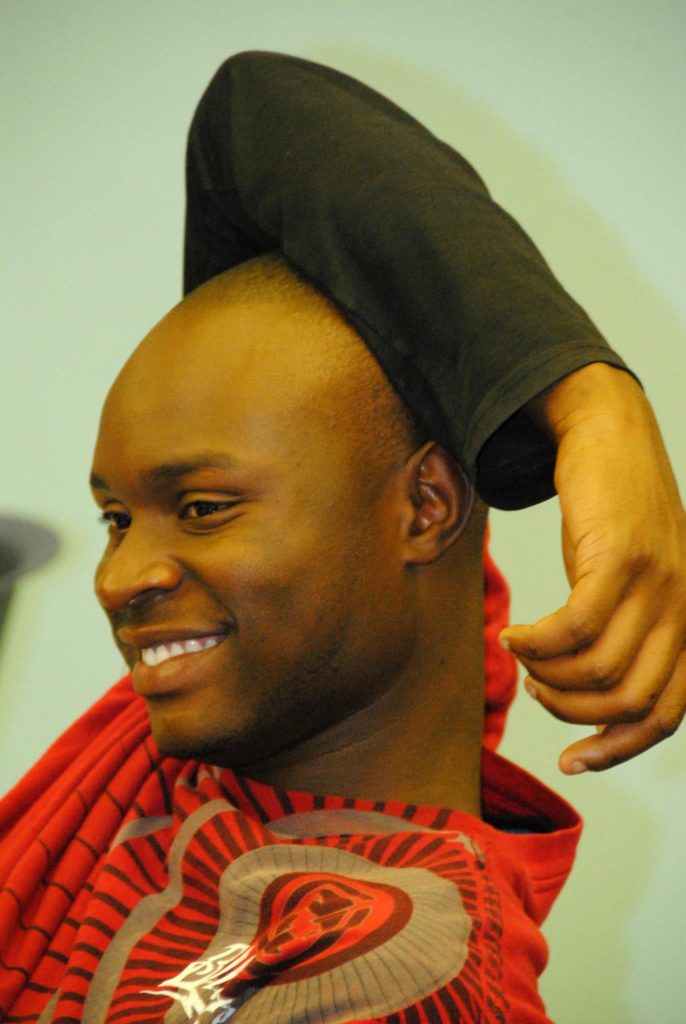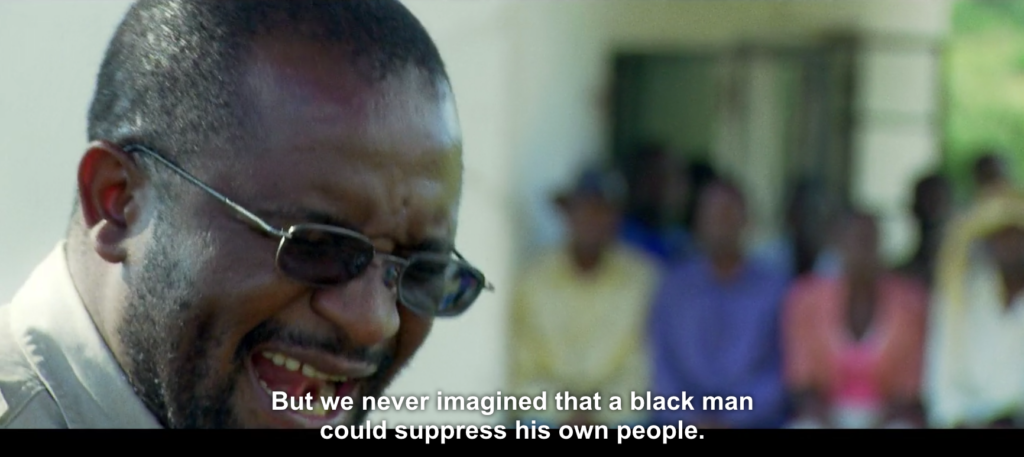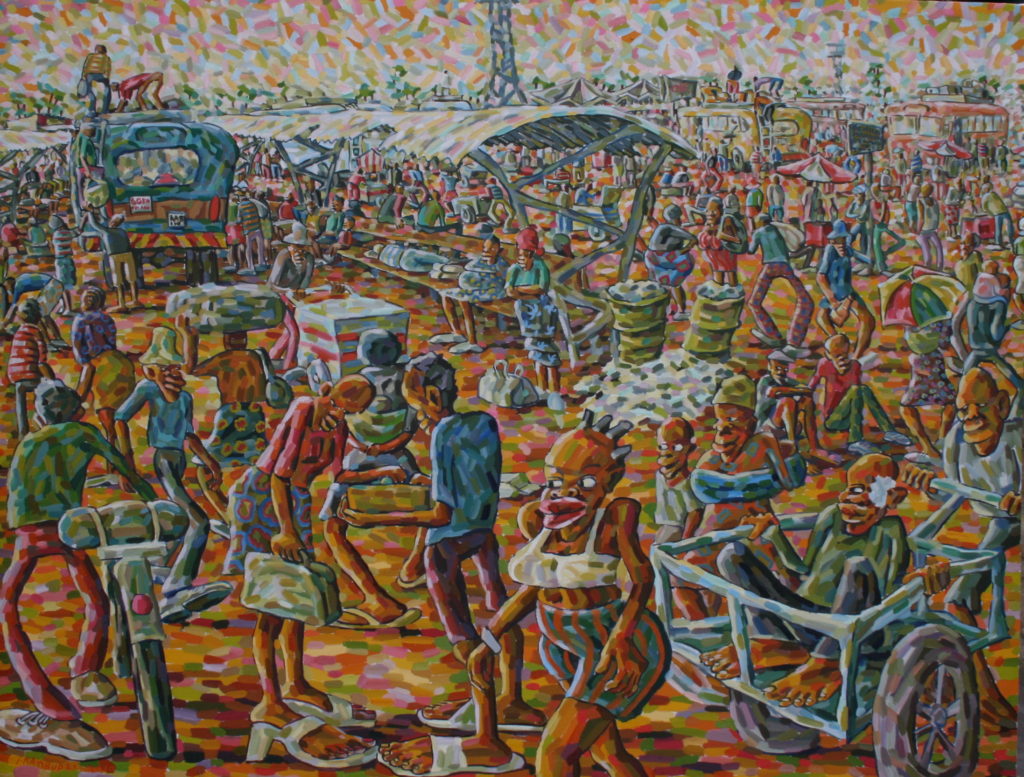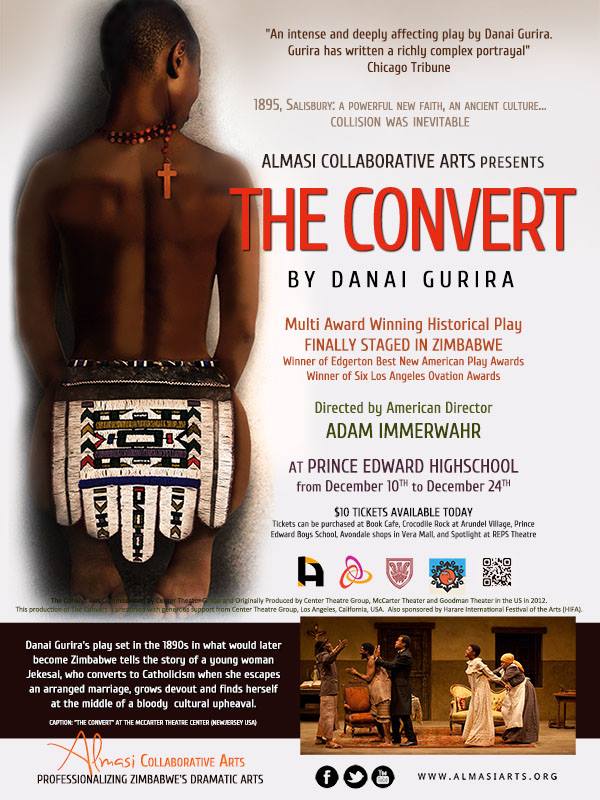Tafadzwa Bob Mutumbi, Performing Artist
Gideon Jeph Wabvuta
Performing Artist
Gideon Jeph Wavuta is a 28-year-old actor and playwright who graduated from the University of Zimbabwe in 2014 and is currently working on his Master of Fine Arts in Dramatic Writing at the University of Southern California in the United States. Gideon has much to say about issues of oppression affecting the people in Zimbabwe. He started off our interview by explaining, “Though Zimbabwe is a country rich in culture and short on freedom, I am determined to make a difference for my country and in my lifetime through my art.” Gideon shared many of the same issues affecting him and influencing his writing as those described by his friend and fellow artist Tafadzwa Bob “Tafbob” Mutumbi.

Gideon explained that after Zimbabwe’s independence from colonial rule, the country has always been a difficult area, largely because it is always about who is in power. In the early 1980s after the Zimbabwe African National Union-Patriotic Front (ZANU-PF) party took power, there were mass killings. This 1983 campaign of terror targeted the Ndebele people in Matabeleland in western Zimbabwe. Robert Mugabe’s Fifth Brigade, massacred more than 20,000 people as a way to silence them. This was the beginning of Mugabe and his party’s effort to terrorize people in order to consolidate power. Political issues became worse in 1997 to 1998 when violence and rioting permeated the country. It was then that the Movement for Democratic Change’s (MDC), which organized in 1999 after the food riots, actively opposed Mugabe and his ZANU-PF party. The military’s power grew and MDC’s effort to improve the people’s needs for food, jobs, peace, dignity, decency, and democracy weakened.
In 2000, President Mugabe and his ZANU-PF party proposed a new constitution in an effort to and called for people to vote on this constitutional referendum. The constitution proposal was framed as a land reform measure that would move them further away from the influence of their white colonial past. But in reality it was a scheme that would give the government the right to take away white-owned farms without compensation and transfer the farms to black owners. It was an effort to thwart the severe economic downturn that resulted in dramatic food shortages. Gideon remembers at that time when he was finishing primary school and about to go to high school, that there was a strong fear in the air. The government used intimidation tactics and their military power to exercise covert violence to pressure voters to approve the referendum. People voted no—the referendum did not pass. The rejection of the new constitution was an enormous failure for Mugabe rule and a triumph for the MDC.
After the failing of the referendum, violence and rioting continued. ZANU-PF targeted the DMC, unjustly accusing them of the unrest in the country and having interest in bringing back the white rule so that they can colonize Zimbabwe again. The human rights abuses were so rampant that by the time of the 2008 elections, Gideon said he was never so afraid in his life. Even today, as it was then, no one can walk freely on the streets because the authorities will pick up people and throw them in a hole with others. People are beaten, abducted, killed, and disappeared. No one can say anything against the government without risking his or her life. It is actually a crime to speak ill of the president.

Following the bitter 2008 reelection of President Mugabe, Zimbabwe initiated the Constitutional Parliamentary Committee (COPAC), a bipartisan constitutional committee to bring about necessary change. COPAC wanted to end the one-party authoritarian dictatorship of Mugabe and the ZANU-PF. Opposing leaders Paul Mangwana of the MDC and Douglas Mwonzora of ZANU-PF oversaw COPAC, working to bring reform of a two-party united country. After the committee’s three-year effort, a referendum was brought to the people on March 16, 2013. An overwhelming majority of Zimbabweans voted for the new constitution. Yet, Gideon believes that the government does not abide by it.

This oil painting by the Zimbabwean artist Lovemore Kambudzi| of the Mbare Bus Terminus depicts the energy and pride of the impoverished Harare people. (credit: https://contemporaryafricanart.wordpress.com/tag/thomas-mu/)
Gideon grew up in Mbare a few miles south of Harare, Zimbabwe’s capital. Mbare is a historically significant place for being the first Zimbabwean township (ghetto) built by the government. Mbare is not an easy place to live. It is home to thousands of people, the majority living below the poverty level. There is a lot of crime. It is difficult for its residents to find work and make money. And because it is a transportation hub for busses that travel around Zimbabwe, there is a high influx of people coming in and out of town. The government provides little support and infrastructure for people to live safely and securely. Houses are built poorly, so much so, that Gideon remembers in 2008 when shacks were torn down and thousands of people were left homeless.
Over the last 15 or 20 years, Zimbabweans try to survive on a dollar a day. Looking back on the early 2000s, Gideon realizes how deprived his family was, though at the time it seemed a normal life. His mother, a former teacher and now a housewife, and his father, an electronics specialist, managed to make ends meet for their family until the Zimbabwe economy crashed in 2002. One day there was food on the table and then the next day, there was nothing to eat. Suddenly there was no money. His parents decided in order for Gideon, his brother and two sisters to continue going to school, they needed to move out of the country. His parents figured out, somehow, to educate all of the children and support them through college. His brother is studying to be an engineer. Both sisters live in South Africa. One is married and works as an accountant and the other sister is in school.
Gideon is the sole artist in his family, but embracing his art came after high school. He came upon a community theatre group and after two years, he was still working with there. His parents were not pleased with his involvement in theatre—they wanted Gideon to attend college. Gideon was determined to pursue his art. He and his parents compromised. He would go to college to study theatre. He knows he made the right decision. He loves performing arts and enjoys what he is doing.
As a professional playwright and actor, Gideon is affected by the lack of freedom of speech and censorship controls in Zimbabwe. He knows that some of his plays will never appear in his country—not in the next 15 years anyway—because his life would be threatened. He, like others, is conditioned to self-censor his work, but his mission is to tell the truth in all of his work. He wants to talk about what influences him and express the inner state that he is feeling. He writes about his passion for his country, the neighborhood where he grew up, and how he hates the ways in which things are being done. He uses his art to try to fix things. And if he can’t stage these stories inside his country, then he finds ways to distribute them through social media. Being in the United States also offers Gideon an opportunity to tell his stories to many people who had no idea about the problems in Zimbabwe.

Before attending the University of Southern California’s theatre program, Gideon was involved with the Almasi, a Zimbabwean American Dramatic Arts Collaborative in 2014. At Almasi he performed in the stage readings of “A Raising in the Sun” and “The Convert”, working with the American director Adam Immemwahr, and directed the stage readings of “Fences” and “Nongogo”.
Since living in the United States in 2015, Gideon has written a number of plays. One is a one-person show in which he also performed called “Mbare Dreams” which he developed at the Ojai Playwrights Conference. “Mbare Dreams” tells the story of the struggles he and his friends experienced, starting when he was 8 years old and up to when he was about 18. This play and his experience at Ojai, prompted Giden to apply to the MFA program in Dramatic Writing at the University of Southern California.
While working on his MFA in 2016, Gideon wrote “The Color of Blood”, a two-hour play set in 1978 Zimbabwe during the liberation struggle. In the play, Gideon tries to understand, what he calls, the “monsters during the war”. Gideon’s current portfolio includes his one-person play called “Hi—Apparently I am Black”. The play describes the Zimbabwean struggle against neo-colonialism and shows the connection between two movements, Black Lives Matters and Zimbabwe’s #This Flag, which encourages people to speak up and provides hope to those who have been repressed and suffered a lot. Another play, “Family Riots”, is set during the 1998 food riots in Zimbabwe.
When asked if he will go back to Zimbabwe when his graduate work is completed—or ever—Gideon said it is a difficult question to answer. He is undecided about whether he will return home or stay in the United States. There is a lot to consider. When he considers moving back to Zimbabwe, he knows that he will benefit others by teaching them techniques of storytelling and how to produce theatre. However, Gideon recognizes that going back home means that his work will not be produced because of the content.
Gideon is leaning towards staying in the United States so that he can create work that has real impact in society. Yet, he faces the difficulty of being far away, which affects his work in an intense way. While living safely in United States, he knows about the difficulties his people face in Zimbabwe and feels he cannot actively contribute to the struggle that his people are experiencing. Fortunately, his art allows him to do the kind of work that makes him feel as though he is a part of the struggle and is fighting along with his people.
He hopes that through live performance art and recorded performances on the Internet, his stories will draw attention from those near and far, teach people about Zimbabwe, and encourage support outside of his country.
Tafadzwa Bob Mutumbi, Performing Artist
